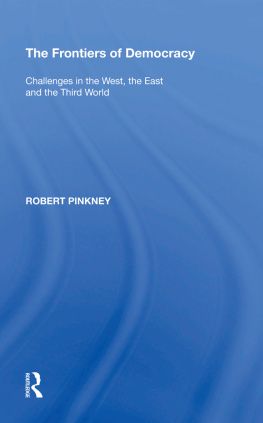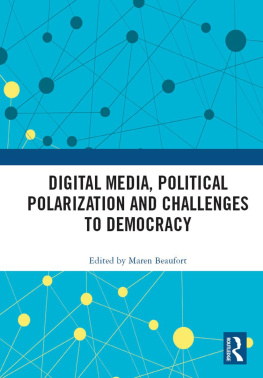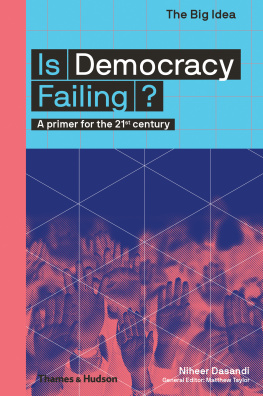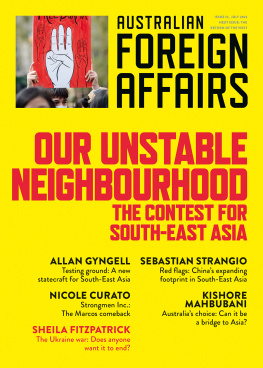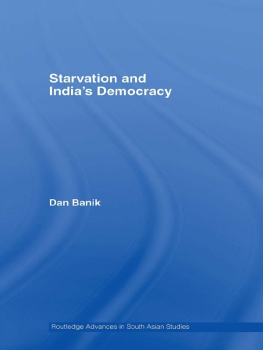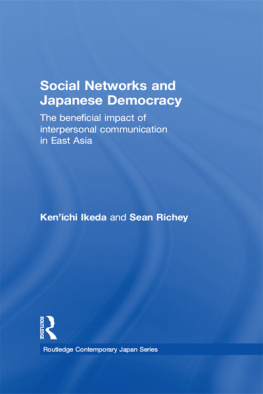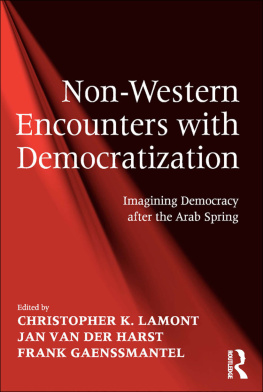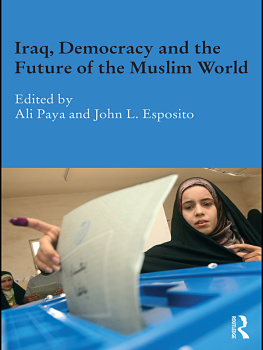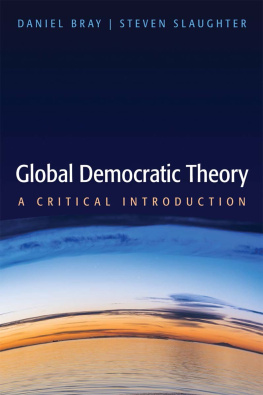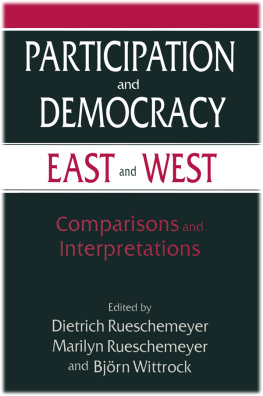The Frontiers of Democracy
The Frontiers of Democracy
Challenges in the West, the East and the Third World
Robert Pinkney
Northumbria University, UK
First published 2005 by Ashgate Publishing
Reissued 2018 by Routledge
2 Park Square, Milton Park, Abingdon, Oxon OX14 4RN
711 Third Avenue, New York, NY 10017, USA
Routledge is an imprint of the Taylor & Francis Group, an informa business
Robert Pinkney 2005
Robert Pinkney has asserted his right under the Copyright, Designs and Patents Act, 1988, to be identified as the author of this work.
All rights reserved. No part of this book may be reprinted or reproduced or utilised in any form or by any electronic, mechanical, or other means, now known or hereafter invented, including photocopying and recording, or in any information storage or retrieval system, without permission in writing from the publishers.
A Library of Congress record exists under LC control number: 2005005671
Notice:
Product or corporate names may be trademarks or registered trademarks, and are used only for identification and explanation without intent to infringe.
Publisher's Note
The publisher has gone to great lengths to ensure the quality of this reprint but points out that some imperfections in the original copies may be apparent.
Disclaimer
The publisher has made every effort to trace copyright holders and welcomes correspondence from those they have been unable to contact.
ISBN-13:978-0-815-39776-2 (hbk)
ISBN-13: 978-1-351-12646-5 (ebk)
Many people have made the completion of this book possible. Northumbria University, the British Academy and the Nuffield Foundation financed my fieldwork in Tanzania, Uganda, Singapore and Malaysia. In Tanzania, Professor Ralph Masenge and Nashi Mnzava at the University of Dar es Salaam helped me to deal with a range of administrative problems, and Patrick Mulindwa at the Makerere Institute of Social Research provided similar help in Uganda. Maurice and Ineke Barnes at the Kabarole Research Centre provided me with a fascinating glimpse at the work of Ugandan NGOs. Professor Peter Lyon of the University of London Institute of Commonwealth Studies gave me a helpful briefing before my departure for Singapore and Malaysia. Professor Jon Quah and Professor Terrence Gomez at the politics departments at the National University of Singapore and Universiti Malaya gave me the benefit of their knowledge of South East Asian politics, as did several of their colleagues. In all the countries I visited, I benefited from the help and courtesy of countless people who held no public offices, but who were happy to make a foreign visitor feel at home.
The research involved over a hundred interviews with politicians, diplomats, NGO officers, think tank members and academics, all of whom were generous with their time. Dr Karen Miller of Glasgow Caledonian University suggested several improvements to the chapter on democracy promotion. At Northumbria University, Maimie Balfour and Dr Austin McCarthy pointed me in the direction of the relevant literature, and Eileen Brady showed infinite patience in imparting her computer skills. My wife Mary checked the first draft of the book with her usual thoroughness and helped to improve the literary style. I am grateful to all those who helped in their different ways. The responsibility for any errors of fact or opinion are mine alone.
Part I
Introduction
Chapter 1
Introduction: Sinking or Swimming Togethe r
The nature, varied characteristics and survival of democracy are never far from the thoughts of social scientists. Academics have argued about it, wars have been fought over it and politicians of varying hues have claimed to practice it. We shall leave any discussion of definitions until later chapters but, at a minimum, most people would expect democracy to enable citizens to have some choice over who rules them and some control over the actions of their rulers. The desirability of such an arrangement can be expressed in a variety of ways, but again one could begin with minimum expectations. Any alternative would allegedly be much worse. Tyrants would imprison us without trial, confiscate our property and tax us without our consent. They might then use the revenue for purposes that suited them rather than us, such as building royal palaces while we starved. Democracy might not prevent all these excesses all the time, but we might feel that on balance democracy is a better arrangement. If democracy goes beyond meeting our minimal expectations, and helps to foster a sense of community, greater tolerance of others, a willingness to compromise, a willingness to share wealth more equitably, or a feeling in pride in national achievements, so much the better.
If democracy has the capacity to deliver us from evil, and to improve the quality of our individual and collective lives, we become curious as to how it can be brought into being, whether through impersonal forces or deliberate human effort; how it can be preserved; how it might be improved to suit the circumstances of a particular time or place, and how it might be destroyed if we are not careful with it. Can we detect universal 'rules', such as the alleged correlation between democracy and economic development, or the incompatibility of democracy with religious intolerance, or is it better to concentrate on the unique circumstances of particular countries at particular times? This book touches on all these questions, but its main concern is with the interaction between the democracies (and semi-democracies) of the world. There is a large body of literature on the condition of democracy in the West, looking at such aspects as declining voter turnout, changes in public confidence in politicians and political institutions, the decline in participation in 'traditional' institutions and the growth of more unstructured participation in protest groups. There is also a large body of literature on democracy in the former Communist Bloc (the 'Second World') and the countries of Africa, Asia and Latin America (the 'Third World'). The latter considers such issues as the problems of establishing democracy after colonial rule; preserving it in an environment frequently characterised by poverty, sharp ethnic and religious divisions and dependence on the outside world; and trying to maintain civilian control over the military. There is also a smaller body of literature on attempts by well-established Western democracies to help in the construction and maintenance of democracy in countries where it is less well established. Such literature is closer to the concerns of this book, but the emphasis in it is often of a one-way process in which those with power, resources and experience pass on their wisdom to others less well endowed.
This book is more concerned with the extent to which the different democracies of the world are dependent both on each other and on common forces that affect the scope of democratic activity generally. The perceived threat of terrorism is one obvious example of a common force, where rich and poor, old and new democracies alike are tempted to curb civil liberties in the interests of national security. Sometimes this reflects spontaneous responses to a common problem, but it may also reflect an attitude of 'if they can do it and justify it, so can we'. The forces of globalisation are another example. As businesses become more able to shift production from one part of the world to another, national governments find it more difficult to control wages, working conditions, taxation, industrial location or the conservation of natural resources, no matter how strong the democratic desire for such control. At the same time, globalisation contributes to substantial improvements in living standards for the wealthiest, and therefore the potentially most politically influential, people in society. The phenomenon of consumerism, which is normally taken to mean the search for personal gratification through the purchase of consumer goods and services (as opposed to gratification through the pursuit of hobbies, sport, the arts or religion), is frequently said to act as a counter attraction to democracy. People, it is said, participate less in communal activities and think more in terms of 'me' rather than 'we'. A sense of the common good is therefore lost. All this means that globalisation can make a two-pronged attack on democracy, by making poor countries less able to control their own economies, while leaving people in rich countries more interested in the market place than in influencing political decisions. This then raises questions as to whether the erosion of democracy is a price the world will have to pay for material advancement, or whether means can be found to tame or harness global forces.

